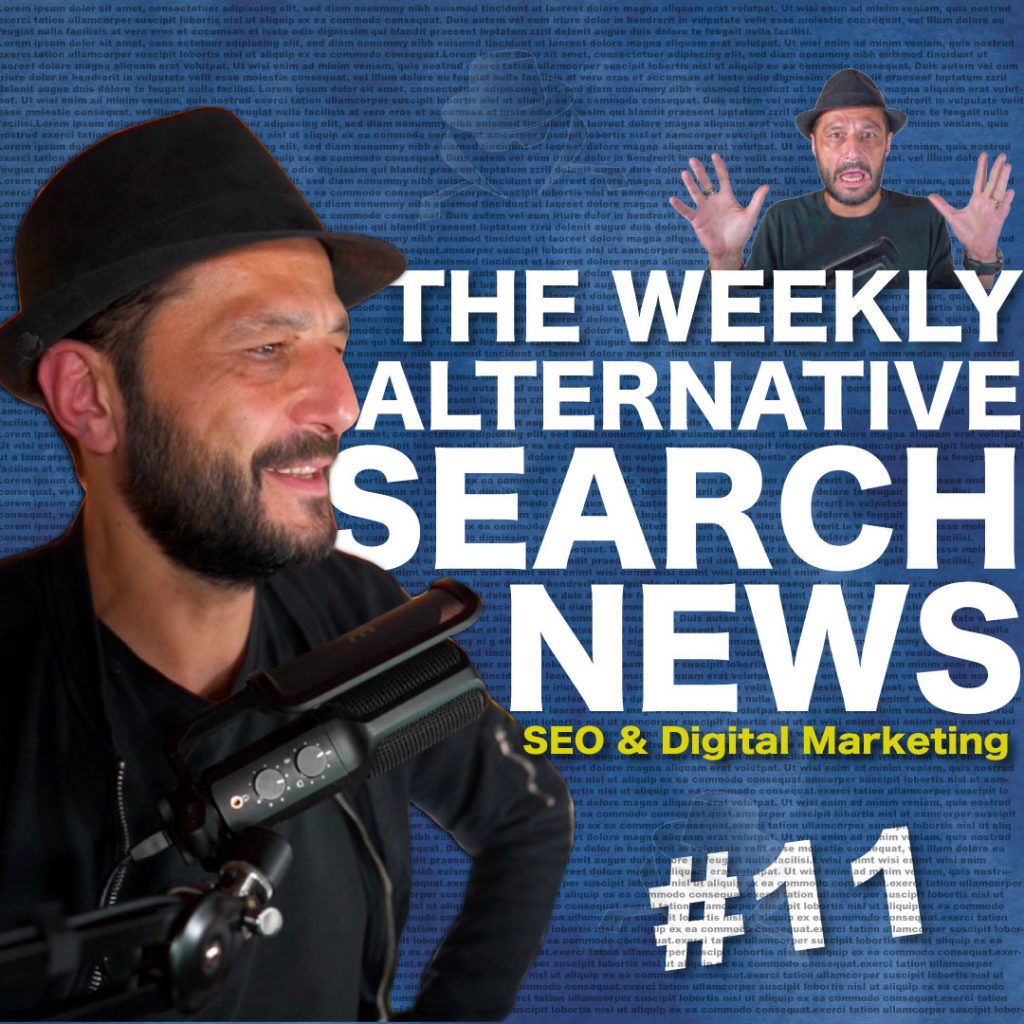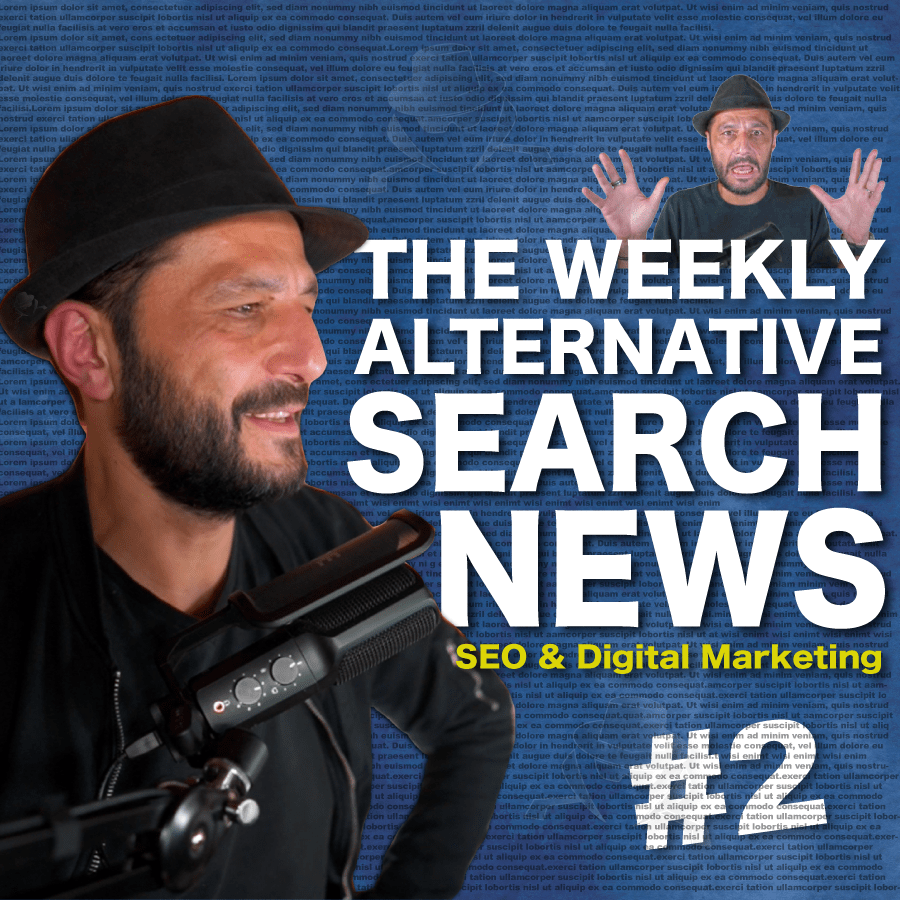Top 4 Negative SEO Tactics that work in 2020 & More in this week’s Alternative Search News #11
A lot happened this week in the world of Search. It was difficult to pick my Top 10 news.
- Wired.com is reporting a very interesting story about a Dutch public broadcaster who got rid of cookies for advertising. Surprisingly, revenues went up… a lot.
- Facebook is showing some efforts to eliminate hate speech.
- A new feature on Google enables autofill in People Also Search For box.
- Someone on Reddit is asking how to come out of a Google manual penalty for thin content
- Open AI GPT-3 is making a lot of noise in the Search industry. Is the era of quality automated content upon us?
- Google wants to favor skills over degrees with a new education program.
- My Top 4 Negative SEO tactics disclosed during the latest #SEMrushChat on Twitter
- Google Chrome wants faster websites on mobile
- Activity Cards from Google want to improve your shopping experience en mobile
Can Killing Cookies Save Journalism?
On Wired.com: A Dutch public broadcaster got rid of targeted digital ads—and its revenues went way up.
So this public broadcaster decided to change the name of the game.
Or, I would say go back to the old way.
Now, what do you do? When you bid on ads, you target a specific user profile, and back in the days, you would buy an ad according to the content displayed on the page. A little bit like Adsense would do actually, but what’s very interesting is that this example shows that it’s possible.
I agree that it’s just one example. Still, they went like 65% up, and they also killed the middleman because these kinds of companies can deal directly with advertisers and contextual advertising, micro-targeting, and all that stuff. It’s subtle, but maybe it’s time to think about alternatives.
Protection of privacy is not a trend; it’s going to be a fight between the ultra-targeting/super-profiling and the protection of personal data.
Who will win? I don’t know.
What I know is that this is interesting. It makes sense because if you think about it, you are reading an article about a specific topic, and if there is a relevant ad about the content instead of whatever is profiling you, maybe that would trigger some more clicks because you are reading about something you are interested in and next to that something there’s an ad in relation with that thing you’re reading about; so instead of profiling you with various techniques and retargeting or whatever, maybe they should focus on that.
Facebook is showing some efforts to eliminate hate speech.
On Gizmodo.com: Mods? MODS!?: Facebook’s QAnon Ban Is Too Little Too Late
I could have also coupled that news with TikTok announcing that they want to fight hate speech and all that stuff.
My take on this? Yes, of course, you have to fight all the hate and whatever is harmful. Is it possible to eliminate all of it? I doubt it.
Is Facebook doing everything they can to fight it? That’s the debate here. In my opinion, they are not trying hard enough. Since the big tech hearing, Google is undoubtedly going all-in, trying to show good faith and trying to improve and fix whatever Congress might come up with to cut down the monopoly. For Facebook, I don’t know; I think the big tech hearing focused more on Instagram bought out the case.
This whole influence of political agendas on social media might not seem like the number one priority as far as the Congress, but we’ll see. Please wait for the report to come up, but certainly, there is always way too much hate on Facebook; it’s insane. You can’t go on that platform without finding some nasty stuff after three minutes of reading.
A new feature on Google enables autofill in People Also Search For box.
On Reddit: New Google Search Box Autofill on Desktop
Actual__Wizard reported a new google search box autofill on desktop.
He took the example of “discovery objections cheat sheet,” and if you do search it on Firefox, you will have on the side, a box with the People Also Search For instead of having that box in the middle of the blue links and you have a little magnifying glass. It means that if you click on that, it will search deeper for that keyword. That’s an interesting feature.
Someone on Reddit is asking how to come out of a Google manual penalty for thin content
On Reddit again: Site with 1000+ pages received a site-wide thin content penalty. What to do?
He needs to crawl the site and maybe start with a site calling operator on google because he’s saying that he thinks his content is legit; it’s not copied, it’s not duplicated, and none of the posts have a number of words below 500.
Thin content is not about the number of words on a page. I’ve treated many websites hit with penalties like that, going back to Panda, and even before.
The number of words has nothing to do with it. Even if you think that your content is unique, it is most definitely inspired more or less strongly inspired up to paraphrased from other sources everybody else is doing it.
I’m not putting any guilt on that, but I know that thin content can be interpreted as too weak or too similar. It does not “bring value,” and I put those words in quotes because the quality of content is a relative notion, and the probleù is that Google puts its thresholds on whatever is quality.
In real life, quality is compared to what? Tastes, values, experience culture, whatever you might like. Something that I don’t like, and the rate is very relative. Now you have Google, its rules, search engines, whatever quality means for it, might not be what you think deserves the stamp of quality.
That means that the website is judged as not being relevant for users.
Open AI GPT-3 is making a lot of noise in the Search industry. Is the era of quality automated content upon us?
On SearchEngineWatch.com: What the commoditization of search engine technology with GPT-3 means for Google and SEO
Open AI is about generating content automatically that could pass for content generated by a human being.
Technology is advancing fast; I’ve been testing since 2004 how to generate content automatically.
I reported the new version of GPT by OpenAI previously in the news, and I think I was a little bit too joyful because I was impressed by the demos.
I know GPT2; I’m using it. It’s very cool; it works. It’s fine, and I thought that version three was going to be a giant leap forward.
Finally, I think it’s just an evolution, not a revolution, and the way they are communicating about it, I feel like there’s a lot more buzz than really anything crazy coming up.
You can still enter your email on their website to access the open beta before it becomes costly.
You can also use GPT2 on Github and try it out first before getting over your head and going crazy on GPT-3.
Google wants to favor skills over degrees with a new education program.
If you go on https://grow.google/certificates/, you will see that Google might be very well attempting to change the traditional education system’s game.
You probably know that in the US, College is very expensive. Students are in debt for years after they find a job, and the debate is what’s better? Skills or degree?
Degree versus Skills.
Yes, back in my days, your degree was mandatory. You had to go through college. Today not so much. I think companies are looking for skills more than degrees, so that’s very cheap compared to a regular college degree.
I mean, it’s still a bit expensive. Right now, we have a data analyst, project manager, UX designer, IT support specialist. So I also feel that those jobs are jobs that Google is looking for, for its own need, and that might be a program even to self-serve Google’s requirements for skilled people, regardless of whether they have a degree.
I will keep my eye on for sure this is something that I like when companies disrupt the establishment, and for sure, there is an establishment about higher education in the US and pretty much all over the world.
My Top 4 Negative SEO tactics disclosed during the latest #SEMrushChat on Twitter
Under my real name on twitter (not under the SEOConspiracy hat), I was invited to participate in the world-famous #SEMrushchat. It was about negative SEO, and I disclosed everything I knew about it.
Well, most of what I know about negative SEO.
On this thread, I share my four main tactics that work in 2020.
But remember, you are big boys, you’re adults, you are responsible.
I’m just giving out the information about negative SEO, and you do whatever you want with it.
It’s for information only and before you try to do anything, think about Karma: don’t do to others what you don’t want to be done to you.
That said, it doesn’t mean that you shouldn’t be informed about how negative SEO works, and does it work?; yes, it does very well, thank you 🙂
Google Chrome wants faster websites on mobile
On Chromium Blog: Highlighting great user experiences on the mobile web
Chromium blog is telling us that highlighting great user experiences on the mobile web is moving forward. So a fast page will be labeled in on a mobile device, and they’re emphasizing doing searches and browsing better on the mobile web.
Yes, there is a lot to do to have a better experience on mobile.
I think websites are still too much focus on the computer version of the browser. But I see the analytics; they don’t lie, you know, I see an increasing number of users coming through mobile and people still building a website for the computer that they adapt to mobile. I think
It’s time to switch it around and develop websites for mobile that will adapt to the desktop.
Activity Cards from Google want to improve your shopping experience en mobile
On Google blog: Find jobs, recipes, and products more easily on Search
The thing is called Activity Cards, and again it’s on mobile. It’s 100% based on profiling you but in the right way. They are trying to help you, and it’s a search feature that is only for you. Nobody else is seeing the same thing as you. It’s a carousel of products that are supposedly interesting for you. We’ll see what that does, but for sure, I don’t know about you but coming from my days of where it was simple: we had a keyword on google, we had a web page, we had a CTR, and that equated to money. Now the experience is much more complicated. The customer journey is way more diverse and takes a long time and on mobile. The conversion rate is most definitely not the same.
I don’t have a magic solution. All I can say is that I’m banging my head
against the walls trying to figure out how to be more efficient on mobile as far as sales and branding.
Suppose you follow what I do, how I try to integrate all the information funnel layers, from the 60% information gathering to the 30% comparison layer, and finally to the 10% conversion & fidelisation part of this information funnel. In that case, I think we need to be everywhere.
Multimedia is the name of the game.
Integrating a robust semantic SEO layer within a global content marketing strategy, spicing it up with a little bit offsite, proper, efficient blackhat SEO is my way, it’s the way to go.
I call it the Topical Mesh; you can look it up on our Youtube and talk about it a lot more very soon.
Thanks for reading! See you next week
Listen to the podcast
Watch the video
Latest posts
- SEO Strategy of the Topical Mesh
- The Biggest SEO News in 20 years
- The Secrets to Ranking First on Google
- Black Hat SEO: Still Alive or Outdated?
- Mastering the Art of SEO: No BS, Just Strategy
- Should You Buy Backlinks for SEO?
- SEO Optimized Content: Stop Overcomplicating It
- How to Build a Winning SEO Strategy
- The Best SEO Strategy for 2025: The Topical Mesh



